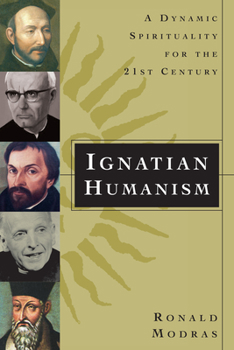Ignatian Humanism: A Dynamic Spirituality for the 21st Century
Select Format
Select Condition 
Book Overview
"Ignatian Humanism puts into perspective our contemporary search for a spirituality that responds both to our search for meaning and desire for God."
--John W. Padberg, S.J., director, Institute of Jesuit Sources "Modras integrates fascinating history, contemporary theology, and inspiring spirituality with consistent focus on central issues for our day."
--Joann Wolski Conn, associate professor of religious studies, Neumann College "A stunning...
Format:Paperback
Language:English
ISBN:0829419861
ISBN13:9780829419863
Release Date:May 2004
Publisher:Loyola Press
Length:346 Pages
Weight:1.10 lbs.
Dimensions:0.9" x 6.0" x 9.0"
Customer Reviews
3 ratings
Jesuit Spirituality: Men of Faith, Courage, and Imagination
Published by Thriftbooks.com User , 18 years ago
This marvelous book concerns the essence of Jesuit spirituality i.e., its rootedness in the human experience. Ronald Modras, in the presentation of his book, turns this concept into action by rooting his discussion of this humanism in the experiences of six men who exemplify the Jesuit Way, beginning with the sixteenth-century founder of the Society of Jesus, Ignatius of Loyola, and ending with his twentieth-century doppelganger, Pedro Arrupe. What struck me about each of the Jesuits discussed is that they were all men of tremendous faith, courage and imagination. I put particular emphasis on the last quality: imagination is at the heart of the Ignatian Spiritual Exercises, which comprise the foundation of a Jesuit's life, and of the Order itself. Following Ignatius, each of the Jesuits discussed here employed great imagination in shattering a paradigm of the society of the time: Matteo Ricci (16th c), rather than remain stuck in European dress, customs, and attitudes, practiced acculturation--becoming a Mandarin scholar--to reach the minds of the Chinese; Friedrich Spee (17th c), rather than accept society's hysteria over a supposed epidemic of witchcraft, talked with accused women, and, at great personal risk, denounced the injustice of tens of thousands of innocent people being executed--his work helped to finally put an end to this madness; Pierre Teilhard de Chardin (20th c), rather than accept a wall between faith and science, sought to reconcile Christian hope with evolution--but first by accepting the validity of evolution; Karl Rahner, rather than hold fast to the notion of salvation only through conscious acceptance of Christ, promoted the concept that all people are given God's grace; and Pedro Arrupe, who survived Hiroshima, rather than simply maintain an Order that was comfortable in its large universities and which gloried in its much lauded successes, pushed the Society of Jesus to making "the promotion of justice integral to the service of faith" (p. 281). Modras devotes too much attention at the beginning of the book to justifying his title: i.e., why "humanism." He in part seeks to rescue humanism from those Christians who equate it with secularism and atheism and, for that matter, from those secular humanists who might abhor religion as centering people outside of their humanness. But witness, for instance, Karl Rahner: he directed the faithful to look to science to better appreciate God's gifts, and made close friends of atheists, because he found that among atheists were also men of profound good will and brilliant ideas. He preached that grace resides within us, that God speaks to us deep within, "deeper than our conscious intellects" (p. 225). He, like all of the other men in this book, are clearly humanists. And they were also all deeply spiritual men, with a spirituality and mysticism that was not "out there" but was experienced right here and now, in the world and in our humanity.
St. Ignatius' improbable legacy
Published by Thriftbooks.com User , 18 years ago
It may seem very unlikely that an ex-soldier, persecuted by the Spanish inquisition, would oneday win favor with the Pope for himself and his followers. This eventually led to the creation of the Society of Jesus. Their legacy includes the precurser of post-secondary education for the masses. Originally free of charge, this education in science and the humanities was offered to woman and the poor or anyone else who sought to be literate. The Society's influence reached throughout the world, and showed that Christianity could adapt to many cultures including closed societies such as China. Where through years of patience and purity, the Jesuits were the first foreigners to penetrate the forbiden city. This is a very informative read.
A profound work of faith and meditation
Published by Thriftbooks.com User , 19 years ago
Ignatian Humanism: A Dynamic Spirituality For The 21st Century portrays the work, teachings, and spirituality of Ignatius Loyola, founder of the Jesuit order, and five of his successors: Matteo Ricci, the first Westerner at the court of the Chinese emperor; Frederick Spee, who stepped forward to defend women accused of witchcraft; Karl Rahner, reknowned Catholic 20th-century theologian; Pierre Teilhard de Chardin, scientist and mystic; and Pedro Arrupe, who has led the Jesuits since the era of Vatican II. The final chapter of Ignatian Humanism focuses especially upon spirituality for and within the rapidly changing 21st century. At once both an extensively researched history and a profound work of faith and meditation on what it means to form a connection with a dynamic, actively involved God, Ignatian Humanism is a passionate discussion especially recommended for modern religious and Jesuit studies shelves.




